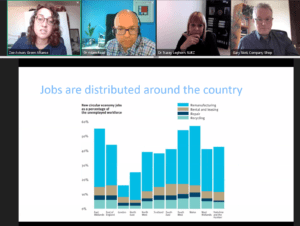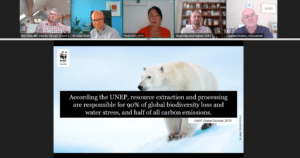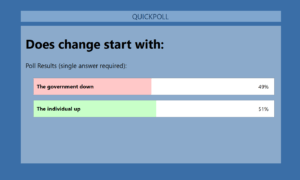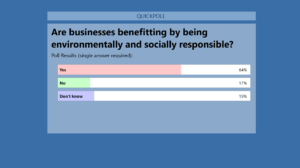The future of business must be the triple bottom line
22nd October 2021
Blog by Dr Adam Read, Director of External Affairs at SUEZ recycling and recovery UK.
With the world now waking up to the perfect storm of climate, biodiversity and social crises, it is clear that businesses and other organisations must play their part fully in tackling these issues head on, because without the private sector delivering its best foot forward, we will struggle to move the dial and more importantly will fail to create a long term, sustainable future.
At SUEZ recycling and recovery UK, we have been realigning our business to truly embed a triple bottom line approach to everything we do, from the boardroom through to each of our 370 locations and our 5,700 employees across the country, and I am proud of the efforts we have made to date. Protecting valuable resources is our primary role, whilst generating a return on investment for our shareholders, we fully appreciate that our people are the beating heart of what we do. Our senior management team acknowledged several years ago that there is so much more we can do (and should be doing) to ensure we are playing our part fully in delivering a business that is not only engaged on the environmental and economic fronts, but equally on the social agenda, both in terms of our people and the communities within which we work. By doing this, we intend to enhance our business so that it is absolutely fit for the future, as ‘businesses that fail to adapt will be left behind’ as the global agendas gather pace and the demands of our customers and shareholders keep pace.
As such, we have spent the past 18 months working hard to understand these issues fully and to weave a more strategic approach into our operations, wherever and whatever they are, with clearer policies and approaches to travel and procurement, for example. We’ve also introduced the Sustainability Champions Network, an employee led activity with 90% of our sites now having a local champion in post, facilitating and delivering change against our ten sustainability principles. The principles were created following employee feedback on what our minimum standards on site should be and sharing this best practice amongst the network so we can replicate it wherever possible.
However, we never like to keep these things to ourselves and in the spirit of cooperation and collaboration, whilst observing the obvious need for more action across our sector and the somewhat unacceptable absence of the resources sector from the COP26 agenda this November, we have developed a series of webinars to share some of the work we have been doing and to provoke some much-needed debate about what we can all do, whatever our role, organisation or location. Each of the first three sessions focused on one specific pillar of a triple bottom line, enabling each panel to delve into each of these important topics, with a number of experts and commentators who are very much leading the charge in this space, to build a common understanding of how we and the sector can push change forward at an ever-increasing pace. Here are my key takeaways from the first three sessions.
People – How will the circular economy benefit people and communities?
Joining me for our first webinar in the series was Zoe Avison from the Green Alliance, Company Shop’s Gary Stott and SUEZ’s own Dr Tracey Leghorn, where we explored the benefits the circular economy can bring to both individuals and communities. This session highlighted the great work of Company Shop, which originally opened in the back of a corner shop. They have grown to a nationwide network of 20 stores across the country, saving over 28,000 tonnes of food going to waste every year direct from food producers and retailers. They’ve also supported over 200,000 people, not just through access to affordable and accessible food, but through developing new skills in their staff and helping get local people back into employment. To me this is a fabulous example of the interconnected benefits of the circular economy and its direct benefits for people and communities.
The session also provided a valuable look into the future, drawing on a recent report from the Green Alliance around the circular economy and levelling up. Delivering a more circular economy will need a growing workforce of skilled individuals (many of these skills are different to those of our sector today). This is something that you won’t be surprised to hear me referencing if you have heard me speak at events (online and in person in recent months) given my ongoing interests in skills and competences in a more circular economy – the current theme of my CIWM Presidential year. An appropriately skilled, and greener workforce is going to be vital for the future of our sector, but we need the right people in the right places to enable this to knit together with the circular economy, as Zoe pointed out – ‘there is no point having qualified engineers in Bristol if your main repair centre is in East Anglia!’

Employers have a key role in driving forward this agenda both now and in the longer term, as they make budgetary decisions about priority training schemes, apprenticeships and industry standards. Tracey shared SUEZ’s approach to employee engagement throughout the employee lifecycle. SUEZ have embedded sustainability issues at the heart of employee on-boarding, and through our staff surveys and frequent ‘listening sessions’ have recognised that people are motivated by doing what they can to support charities and the environment. As such we are now supporting a vast array of community outreach activities, whilst also increasing the amount of training our people get to help them prepare for the shifting demands of our sector as we head towards 2030.
But what is the scale of change that we need to achieve to deliver a more circular economy and create these benefits? The circular economy could create 500,000 new jobs and reskilling opportunities by 2035, so there is no shortage of opportunity here. The audience summed up this challenge nicely with 76% agreeing with the panel that we need radical change, whilst Tracey suggested prophetically that “we need evolution at a revolutionary pace.”

Planet – Is Environmental Responsibility Simply About Resources?
Next in the series the focus switched to all things environmental and being the resources sector, we obviously focused our attention on putting resources to better use or preventing them from becoming waste in the first place. However, as I explored these issues with our star-studded panel including Countryfile and 39 Ways to Save the Planet’s Tom Heap, WWF’s Paula Chin, Groundwork’s Graham Duxbury and SUEZ’s own Stuart Hayward-Higham; our impact is far wider reaching than this. With 90% of biodiversity loss and 45% of carbon emissions associated with the what we consume, our sector has a vital role to play in the fight against both the climate and biodiversity crises. However, this needs a fundamental systems change as Paula explained (and the panel agreed), but we must do this with the most disadvantaged in mind, as they will suffer the most if we get this wrong and potentially benefit the most if we get this right.

Everyone has a fundamental role to play in this change, through individual behaviours like dropping litter to putting recycling in the correct container, we rely on daily decisions which underpin the success or failure of our system. Graham highlighted the work Groundwork are involved in right now delivering social benefits through environmental based actions. Their focus is on the obvious issues that are right in front of people, such as litter on the streets, something they can see the impact of, compared to climate change and its more global and somewhat less visible issues. He also rightly pointed out that we need to normalise the right behaviours to really create a widespread change, and that is far easier said than done! While Tom questioned whether people have the genuine desire to do ‘the right thing’, especially when it means changing what you do or doing something proactively or differently to others. And the current English household recycling rate is testament to this, with 46% being our undesirable performance ceiling for a number of years.
The biggest message for me from this session was the obvious need for both individual (bottom up) and governmental (top down) action in order to generate the change we need. This sentiment was echoed by the audience through the one and only poll question I managed to run during the jam-packed session, with 48% agreeing that change must start with a government down approach and 52% agreeing it was with the individual up. No surprises there.

Prosperity – Is the triple bottom line good for business?
The third webinar focused on being a sustainable business, and what this means. Straight out of the gate on this webinar I challenged our CEO, John Scanlon with the question “is profit a dirty word?” to which both he and our panel all agreed that it isn’t, as it enables a business to function (to be viable) and that means paying employees (creating social benefits), investing in new technology, with associated environmental benefits and ensuring it can deliver against any number of other key metrics that help define your business. In our case all of which align with the triple bottom line, and this really set the tone for the final session of the series.

Joining John were Chris Turner of the Better Business Act, Andrew O’Brian of Social Enterprise UK and Emma Burlow of Lighthouse Sustainability, all of whom are actively supporting and enabling businesses to be both ‘successful and sustainable’. This area is rapidly expanding with Andrew pointing out that the number of social enterprises has grown by 15% since the first lockdown in March 2020, whilst Chris as part of B Lab have seen certified B Corps outperform other SMEs in all of the 10 key areas they monitor, including growth, innovation and attracting employees. According to the panel it really pays to be a ‘responsible business’ right now as so many organisations are having to reassess their business and those, they work with in light of both BVREXIT and COVID. The front-runners in so many sectors are those aligned with the B Corp and/or social enterprise movements.
We also explored the role of policy in enabling change for the better, with the Better Business Act aiming to make the triple bottom line a legal requirement for businesses, it may help overcome some of the current inertia and help to move businesses in the right direction, by breaking down perceived barriers such as cost. Wales’ Future Wellbeing Act was highlighted by the panel as a good example of legislation paving the way for real on the ground change and aligning the public and private sector better in this regard.
Ultimately financial performance is an output of your environmental and social activities, and the panel were clearly aligned that this will be the blueprint of successful business in the future and as Emma pointed out “linear businesses put the economy in the ground, whilst circular businesses drive the economy round and round.”

And the audience agreed with the panel that being a responsible business was ‘good for business.’

John wasn’t shy in sharing how SUEZ have focused on supporting our staff as we face up to the challenges of being a responsible business. By listening to what our people are interested in and what motivates them, we have been able to develop a programme of training, support and community outreach that is not only delivering huge environmental benefits and social value outcomes, but is also ‘rewarding’ our people and inspiring them to be the best they can be. Staff that are happy are more productive and are less likely to look to leave, so whilst we can inspire and empower we must do so, and then we can harness that energy and resource fully for doing a lot of good within the communities we are based.
This is evident daily as the Network of Sustainability Champions share videos, photos and updates on their initiatives from bug houses and beach litter picks, to changes in suppliers with environmental upsides and lower carbon footprints etc. It really is an inspiring place to be right now!
What next?
So these are just some of the highlights from the first three sessions, but we have so many more lined up to help broaden the discussions and offer up ideas and insights from a range of organisations and experts about how we can move this agenda forward.
We are only just beginning some of the much needed conversations about the broader sustainability agenda, from the political heights of COP and beyond, to the individual actions that we and the rest of society need to make in order to turn the tide on these global challenges we are facing. But time is running out and the time to act is very much upon us. In order to make the progress we need, we must have business, citizens and government performing at their very best, and I’m looking forward to exploring more about the role the resources and waste sector can and will play in making that happen in future sessions, including our fringe workshops at COP26 – so watch this space!
If you want to watch any of these webinars back, you can access them through the links below.
How will the circular economy benefit people and communities?
Is environmental responsibility simply about resources?
Is the triple bottom line good for business?
If you want to find out more about our upcoming events and activities around the triple bottom line, and our plans for COP, then sign up to our newsletter here.
Tweet